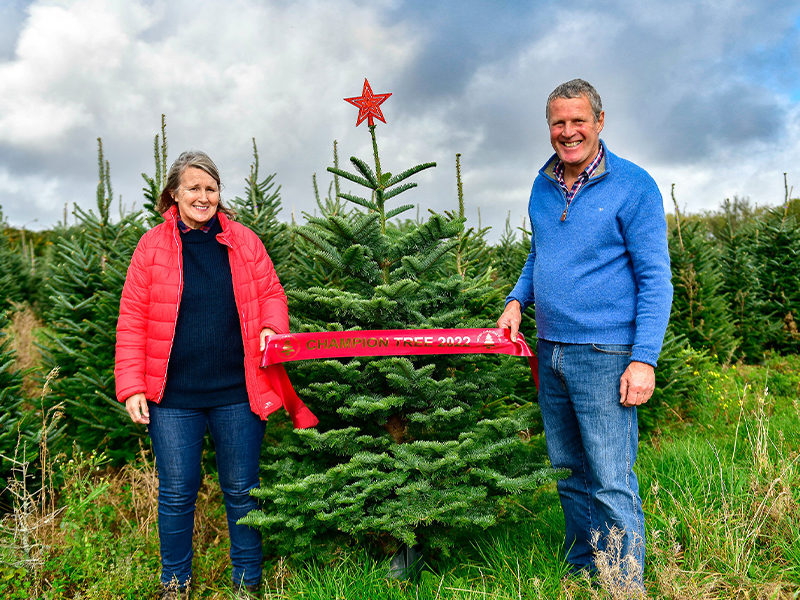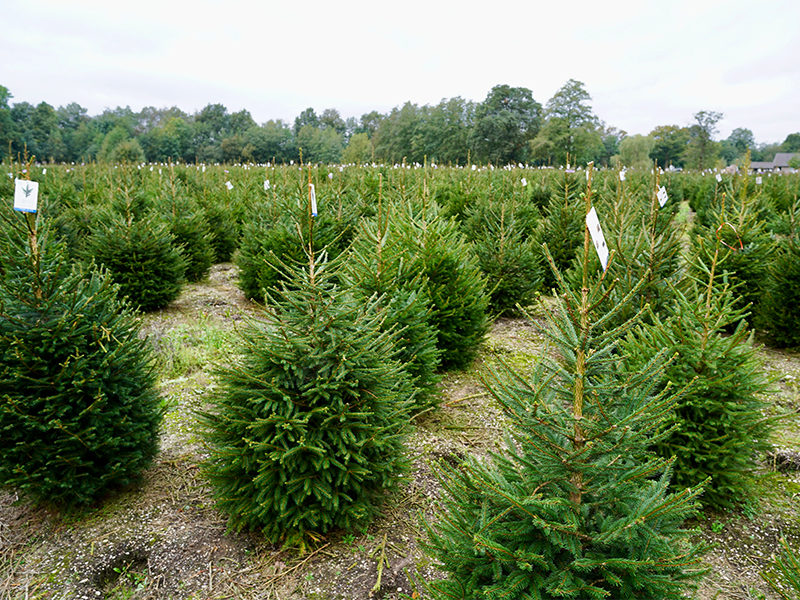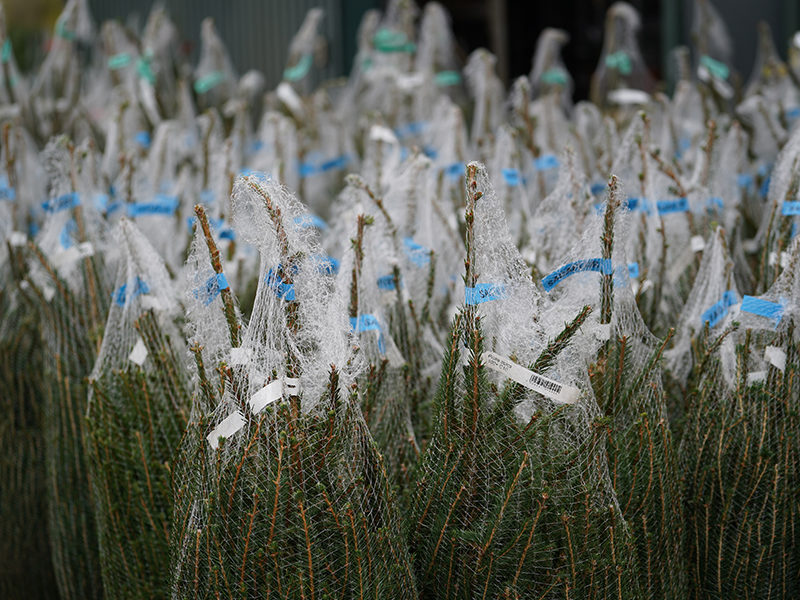Christmas tree champion
Simply the best
Forget the Oscars or a Nobel Prize, for a business that spends years growing the centrepiece of the festive period the ultimate accolade is being named Christmas Tree Grower of the Year. Organised every year by the British Christmas Tree Growers Association (BCTGA), the winner is bestowed the honour of providing the tree for one of the UK’s most famous residences – No 10, Downing Street.

This year, Russell and Liz Stanhope from Bishops Offley Christmas Trees beat off stiff competition to win the honour. The pair planted their first trees in 1995 before gradually expanding. By 2000, Russell and Liz were ready to sell their first crop of Norway Spruce and they haven’t looked back since. “We’ve built the business up but we’re still relatively small at 10 acres,” Russell says.
Russell and Liz were chosen as the Champions after impressing judges with their submitted tree, a Noble Fir. “The Noble Fir is a very difficult tree to grow,” Russell explains. “They’re stunning and they have the best needle retention by far out of all the trees. However they’re very fussy about soil – they like very well-drained ground, but heavy rainfall. We didn’t quite have the rainfall they need this year, but we persevere with them because they’re a nice tree. But if you plant 100 Noble Firs, you’re lucky if you harvest 30 or 40, whereas if you plant the same number of Nordmann Fir, you’ll get 80-90%.” The tree Russell delivers to Number 10 on 25 November will be a Nordmann Fir and will stand roughly 20ft high.

Growing Christmas trees
A Christmas tree is typically in the ground for eight years before it is cut down, meaning that each one is a labour of love for growers such as Russell. Every variety is susceptible to different pests, although aphids are the main concern. “For a Norway spruce, the aphids will be busily eating away over the winter, so if you don’t control them by the spring the needles will be looking brown and start to drop off,” Russell says. “Fraser Firs and Nordmann Firs are generally susceptible to a summer-acting aphid, so you do need to have a spray programme unless you’re particularly lucky. When you start off small you don’t really notice pests, but once you start planting more the pest problems build up and you need to be on top of them.”
Russell uses various products but recently he has been applying a natural pyrethrum to kill giant fur aphids. “They don’t actually cause any harm to the crop, but they’re quite big and if you cut the tree down in November and it goes into someone’s warm, centrally-heated home, they could wake up in the morning to find thousands of flies,” Russell explains. “So we spray in the autumn for that and use a natural pyrethrum as it has a shorter shelf life, which means there aren’t any residuals left by the time people want to buy a Christmas tree.”
The future
Sustainability is a priority for both Russell and the wider Christmas tree industry. “A lot of growers are moving towards planting clover as that provides ground cover without affecting the growth of the trees too much,” Russell says. “I’ve tried sowing it in the past and it never seemed to work, but I do have fields where it seems to be spreading quite naturally so we’ll just keep working with that.”
He has also trialled more sustainable forms of wrapping but has found the current products on offer cost much more and don’t perform as well. “We’ve trialled fully compostable netting, but its two or three times the price and not as user friendly – it’s quite frustrating to use and it rips very easily,” he says. “Once they get the volume they need, hopefully it will come down in price. But at the moment it’s too expensive so we’ve gone for a reduced-rate plastic netting which is a good compromise.”
This year has been tricky for many Christmas tree growers and Russell admits to feeling a bit nervous about the coming festive season as the cost of living crisis forces many to tighten their belts. “Generally, I would say it’s been a bit quieter, but 95% of our business comes from us selling the trees at the farm, so we just have to hope the customers will come,” he says. “There has definitely been less interest in the bigger trees which people order in advance and we’ve had to put our prices up a bit to cover costs – I have to buy in some of the bigger trees and we’re paying at least 10% more for those.”

And the worries don’t stop there. The UK’s very hot summer has been followed by a mild autumn and the frosts usually seen by the start of November haven’t materialised. “Frosts help needle retention so I’m a little nervous about the fact that we haven’t had any yet." In terms of the future Russell plans to cut down the number of tree species from nine to the four or five that perform best. “Nordmann Fir tends to perform well and it’s the most popular too,” he says. “Fraser Fir is a lovely tree, but it’s difficult to grown – they’re very affected by the balsam woolly aphid which can kill them quite easily if you don’t keep on top of it.”
Russell thinks we may see traditional favourite, the Norway Spruce, make a comeback at some point soon. “In the past, people cut it too early and didn’t put it in a water-retaining stand, so in a hot house it would quickly look tired and all the needles would fall out,” he says. “Educating consumers is the key - If you look after them, put them in a decent stand and don’t put them in the house too early, they will be fine. We’ve used them from 10 December before and haven’t had a problem, but a lot of people want a tree up earlier than that nowadays – during lockdown, we saw people putting them up in the middle of November.”
Russell and Liz Stanhope found out they’d won the overall prize at Gower Fresh Christmas Trees in Swansea at an event attended by Liz Green, Syngenta’s Marketing Communications Manager for EAME. Liz said: “BCTGA’s annual competition is a great celebration of achievement for ornamental growers who specialise in Christmas trees. It’s been a difficult year for this highly specialised industry but this competition proves that the quality of British Christmas trees is still exceptional, no matter what challenges growers need to contend with. It’s a great honour for the winners to have one of their trees displayed at one of the most iconic addresses in the world. Syngenta is proud to be part of such an iconic industry, working alongside a skilful group of professionals to bring joy to our nation’s homes every winter.”